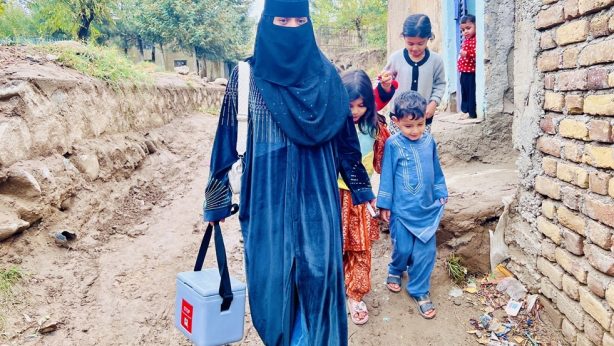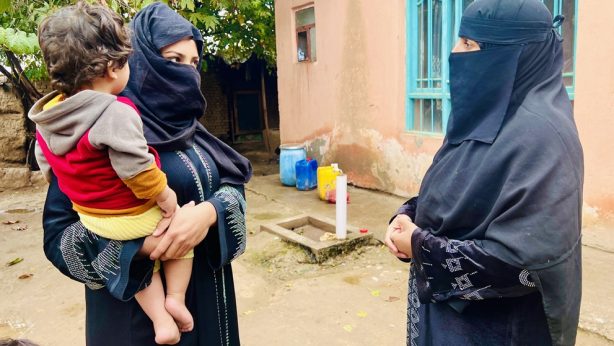Control of Poliovirus in Herat: A Major Achievement by Female Vaccinators

Marzia Frotan
Herat, Afghanistan – Nazanin Yousafi, wearing a black hijab and carrying a vaccine carrier box on her shoulder, knocks on the door of a house in an old street in Herat city, and requests the elders of the family to bring their children outside for polio vaccination.
She, who is 23 years old, has been working with the polio eradication program for the past three years, dedicating her time to vaccinating children as a volunteer.
This vaccinator enters homes and administers the polio vaccine to all children under the age of five, regardless of whether they are newborns or ill.
More than 90 percent of the polio vaccination campaigns in Herat City and its surrounding areas are carried out by female vaccinators.
After Herat and the western region were declared polio-free, Nazanin felt immense joy in the fact that she and her colleagues’ efforts of several years had finally paid off and they had succeeded in defeating polio.
“We always strived to visit every household to ensure no child missed out on vaccination. Despite encountering opposition from some families, we persevered and successfully convinced them to vaccinate their children,” she added.
Yousufi emphasized that in addition to controlling the poliovirus in Herat, they are steadfastly working to vaccinate all children during every campaign, with the ultimate goal of eradicating the roots of this virus forever in Herat and throughout Afghanistan.
 Nazanin Yousafi administering the anti-polio vaccine to a child in Herat © Polio Free Afghanistan/2024/ Marzia Frotan
Nazanin Yousafi administering the anti-polio vaccine to a child in Herat © Polio Free Afghanistan/2024/ Marzia Frotan
Nazanin Yousefi’s colleague, Masooma Mohammadi, is another vaccinator in Herat city. She diligently goes door-to-door in the streets of Herat’s old city during every campaign, ensuring the vaccine reaches every last child.
Masooma Mohammadi acknowledged that there are societal restrictions against female vaccinators. However, she and her colleagues chose to disregard these restrictions in their determination to safeguard children from polio.
“Our objective is to safeguard children from polio, and I am thrilled by the fact that we are nearing this goal,” she added.
Mohammadi expresses her heartfelt hope that the polio disease will be completely eradicated throughout Afghanistan, ensuring that no more children suffer from this debilitating illness or face disability.
Many residents of Herat also believe that the role of female vaccinators has been pivotal in controlling the poliovirus in this province.
Saeed Razai, a father, emphasized that female vaccinators play a key role in controlling the poliovirus in Herat. Through entering people’s homes, they have been able to vaccinate all children.
He added, “The involvement of female vaccinators is a great convenience for us. Previously, male vaccinators would visit our homes, requiring us to take a day off from work to be present while our children were vaccinated.”
Health officials in the West report that no positive cases of polio have been recorded in this zone for the past three years, and the poliovirus hasn’t been detected in the environment.
Mohammad Asif Kabir, overseeing the National Immunization Program in the Western Zone, explained that the World Health Organization designates an area as “polio-free” when no positive case of polio has been reported in that region for three consecutive years, and no samples of the poliovirus have been detected in the environment.
“The polio vaccination campaign is proceeding as usual in all the high-risk areas of the western region, and we will continue our campaigns until polio is completely eradicated from the country,” he added.
In 2023, there were 6 confirmed human cases of polio recorded at the national level, along with 62 environmental samples. All the human cases were reported in the eastern Nangarhar province of the country.


